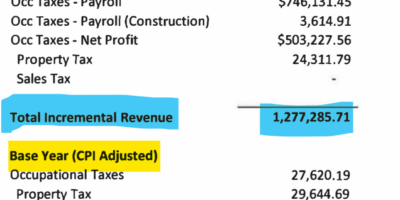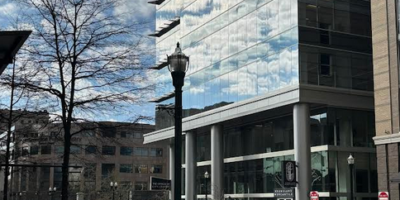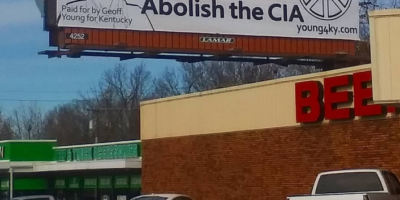By Jeff Gross
Last week, news emerged that four members of the Urban County Council (Vice Mayor Linda Gordon, At-Large member Steve Kay, First District’s Chris Ford, and Fifth District’s Bill Farmer, Jr.) met privately with Bishop Gainer to ask him to address concerns about the Catholic Action Center. The Center is independently run, but the property is owned by the Diocese of Lexington. Beverly Fortune’s “Neighbors’ complaints about Catholic Action Center get Attention at Lexington’s City Hall” in the Herald-Leader outlined the common complaints against the Center and potential actions being weighed by the councilmembers. The Catholic Action Center’s response, available on their Facebook group page, convincingly articulates their record for service and their commitment to working with the neighborhood. You can also search North of Center’s archives for my previous writing on this topic.
In response to complaints about loitering, noise, public intoxication, and litter, Kay suggests that one potential solution would be to expand the city’s nuisance ordinance to cover commercial property: “The current ordinance says if you have more than two police citations in a certain period of time, the building can be closed for one year.” In a moment of forced austerity, especially for already impoverished and struggling Americans, and in light of Lexington’s budgetary cuts to social services and public safety, the legal loophole nuisance ordinance “solution” poses an especially dangerous and impractical threat to private agencies that provide a safety net for vulnerable citizens. If government agencies cannot care for citizens (especially those who suffer from addiction or mental illness), then they must find ways to work with the agencies that can and will do that work.
Like Steve Kay, I live in the neighborhood of the Center and, like Kay, I live far enough away from the Center never to hear or see much of the “raucous behavior and crowds” cited by Fortune. On nights of snow or freezing rain, I have passed by the Catholic Action Center to witness a full room of people who had no other place to stay warm and dry. I have also witnessed the Center act as a good neighbor. At a 2010 William Wells Brown neighborhood cleanup event, the majority of the volunteers came on behalf of the Center.
What I fear the councilmembers may be too hasty to consider before implementing a stricter nuisance ordinance is the simple fact that, for many of our poorest citizens, access to the Catholic Action Center — and places like it — is literally a life or death issue. Access can mean the difference between surviving a winter night or dying from hypothermia. A move to shut down the Catholic Action Center, the Community Inn, or similar facilities without first finding alternatives to meet the needs of those who depend on these places would show a cruel disregard for human life.
To Kay’s credit, he twice responded to my questions on his “Steve Kay for Lexington” Facebook page. Kay agreed “that the entire question of services for the homeless needs more attention than it gets,” but he stressed that these services must “be provided in a way that does not negatively impact their neighbors.”
But do the Council Members even recognize those individuals experiencing homelessness as our neighbors, their constituents, and Lexington’s citizens? When councilmembers suggest they have to act on this issue to protect their constituents, they seem to define their constituency based on exclusion: those who have homes are valued and those who don’t are disposable. At least that’s the risk. We risk pitting one community against another.
Broader disenfranchisement
Many persons experiencing homelessness in Kentucky have been disenfranchised because of prior felonies. A recent move in the United States has been to institute voter ID laws that make it even more difficult for people experiencing homelessness to vote. We risk excluding all persons who experience homelessness from state membership.
Some Kentucky election officials worry about homeless persons packing electoral districts and swinging a vote. Boone County Clerk Kenny Brown has argued that the Secretary of State’s directions to register homeless voters increases the possibility of fraud. A July 26 story from The Daily Independent in Ashland, KY, quotes Brown as saying that his office had seen “between three and five” (meaning four?) homeless persons register to vote in the past week, but he feared what could happen “if someone walks in with a sack of them.” State Election Task Force co-Chair, Senator Damon Thayer (R-District 17), worries that “a precinct could be packed” and compared the potential to supposed ACORN voter registration fraud. Even while conceding that the likelihood is small, Thayer couldn’t help but be paranoid: “but it could happen, couldn’t it?” Just how significant is this threat? According to LEO Weekly’s FAT LIP blog, of the 93 homeless persons registered to vote in Louisville, two voted in the 2010 election.
Republican nominee for Kentucky Secretary of State Bill Johnson takes Brown and Thayer’s fear one step further, stating, “If an address cannot be determined, then a person should not be allowed to vote. It’s that simple.” Apparently, Brown, who boasts that his 10 years of Navy service demonstrates his dedication to service, feels that his estimated 1,000 homeless veterans in Kentucky should not have the right to vote. In 2011, Republican-controlled legislatures in a host of other states (Alabama, Kansas, Tennessee, Texas, Wisconsin, South Carolina, and Rhode Island) have instituted strict voter ID laws, a twenty-first century equivalent to poll taxes that, as critics note, will make voting more difficult for persons with disabilities and from minority groups.
Kenny Brown, Damon Thayer, and Bill Johnson redefine homeless persons. Not members of our state who deserve basic rights and services, the homeless, in this view, represent foreign invaders who threaten the democratic system. Of course, it is Brown, Thayer, and Johnson who threaten democracy through their efforts to redefine the state’s constituent members in ways not wholly different from past exclusions in U.S. history. The landmark 1857 Supreme Court decision in Scott v. Sandford declared that “[African Americans] are not [constituent members], and that they are not included, were not intended to be included, under the word ‘citizens’ in the Constitution, and can therefore claim none of the rights and privileges which that instrument provides and secures for citizens of the United States.” Sadly, it seems that some of our politicians and candidates at the state level seek again to implement state power to mete civil death for entire groups of people.
The Need for Community Discussion
If we are to believe Brown, Thayer, and Johnson, the homeless, it seems, are to be feared. The Herald-Leader article on the Catholic Action Center introduces another kind of cultural fear. For students at William Wells Brown Elementary School, they should not have to pass poorly clothed and dirty persons standing at the corner of Fifth and Chestnut. (I think our real fear should be that, with cuts in education and social services, we are producing a generation who might be walking by their own future when they pass the Center.)
At stake for Lexington, for Kentucky, and for our nation is the very definition of what a community is. Will we include all persons in our community and seek solutions that serve everyone, or we will draw boundaries that exclude the most vulnerable of our people? The outcome of this controversy will determine what kind of community Lexington will be. Are we compassionate, or are we callous?
An expanded nuisance ordinance is not an acceptable solution. In fact, such a move would represent nothing more than a short-sighted opening of a legal loophole that could be used in the future to shut down any site of congregation opposed by neighbors. I would hope that by now that common sense and reflection has already led the Council to scrap this idea.
I voted for Steve Kay and Chris Ford because I trusted (and still trust) that they were best intellectually and ideologically equipped (in ways, evidently, that politicians like Brown, Thayer, and Johnson are not) to deal responsibly with the problems that all Lexington residents face. Moreover, I believe Kay when he says these issues deserve further discussion, and I ask that Councilmembers Kay, Ford, Gorton, and Farmer lead the way in these discussions, and that they hold these discussions, not in private with Bishop Gainer, but in the open with all the stakeholders—persons who rely on the Catholic Action Center’s services, neighbors of the Center, Center volunteers, and concerned citizens — allowed to share and participate. I also call on Ginny Ramsey and Judy Mclaughlin to stand behind their commitment to being active and responsible neighbors. I am heartened to hear that there have already been productive discussions between neighbors and the Center.
Finally, I call on Lexington’s citizens to make their voices heard on this issue. In the end, will we be defined by our collectiveness or by our callousness? Call or email your representatives in Lexington, Frankfort, and Washington and ask them to work on behalf of all people before they further disenfranchise and dispose of marginalized groups. In the short run, we must act in ways that ensure the continued operation of the Catholic Action Center and remember that human lives are at stake. In the long term, we need to guarantee that those who experience homelessness will be accepted as members of our community and receive the benefits and rights available to them.




Leave a Reply